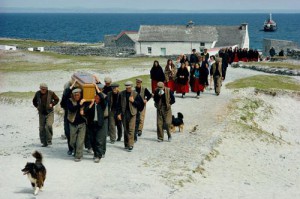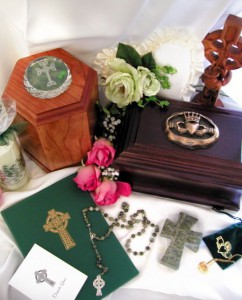There is something to be said for an Irish funeral, which is often referred to as a wake. More commonly a celebration, as opposed to a time of mourning, this type of service allows family and friends to become further involved in the planning process.
 Prior to the mid 1900’s these events turned into large celebrations partly because men were not otherwise allowed to congregate, for fear of planning rebellion against the British government.
Prior to the mid 1900’s these events turned into large celebrations partly because men were not otherwise allowed to congregate, for fear of planning rebellion against the British government.
Until 15 or so years ago, Irish funeral ceremonies always took place in the home. Today, many are held in a different location such as a garden or country club setting. Locale is typically based on something or someplace the departed enjoyed.
An old-fashioned Irish funeral was looked upon as a social event, which could last as long as three days. The premise was not to leave the decedent alone, during that time. The term “wake” was used due to the fact that family members stayed with the body at night, making sure its spirit didn’t come back to life and evil spirits didn’t try to claim it.
A window was opened as soon as the person died. The body was dressed in dark clothing or covered with a white shroud and placed on a bed or in a coffin. No embalming was necessary. Candles were placed above the decedent’s head and boots were placed at his or her feet, in effort to make the journey through purgatory easier. Out of respect, clocks were stopped and blankets were placed over mirrors.
 There was and still is plenty of food and drink (usually Irish whiskey and Beer) at an Irish funeral. There is also music (bagpipes), dancing and games. When any type of card game is played, it is customary to deal an extra hand for the person whose life is being celebrated. Contests of strength sometimes occur as well.
There was and still is plenty of food and drink (usually Irish whiskey and Beer) at an Irish funeral. There is also music (bagpipes), dancing and games. When any type of card game is played, it is customary to deal an extra hand for the person whose life is being celebrated. Contests of strength sometimes occur as well.
“Keening,” the Irish term for a display of sorrow, is an old tradition that still takes place at some wakes. Professional mourners are hired to do things like wail, cry and even recite poetry.
A pipe of tobacco is passed around as a means to assist the spirit of the loved one on his heavenly journey. Each person who smokes the pipe is encouraged to share a bit of wit and wisdom with the crowd.
On the one month anniversary of the wake, a “month’s mind” is held in a church to again celebrate the life of the person who died. A yearly mass is held as well.
In modern day USA families are getting more involved in planning and participating more in caring for their own dead. Home funeral are more common than they were 20 years ago. Baby boomers are not wanting services on thousand year old impersonal ceremonies. Because many are now choosing cremation services there is the freedom of more time for families to plan a more detailed and personalized memorial gathering.
More American families are now choosing to work with a funeral celebrant, when it comes to the details of the actual funeral ceremony or service. A celebrant is extremely versed in all aspects of a funeral. This includes everything from funeral history to the funeral rituals of many cultures. He or she can perform tasks like writing the perfect eulogy, offering advice in ritual and customs that may suit the individual needs of each family. Unlike clergy, celebrants are more open to handling families with multiple cultures and religions that are found in much of society today.
Celebrants take the time it takes to get an in-depth look into the life of the person they are memorializing. This information, coupled with things like the rest of the family’s personal values and religious beliefs, tend to make it a much more meaningful funeral ceremonies. The funeral home staff can often recommend a local celebrant or you can contact the Celebrant Foundation and Institute to find a celebrant near you.
Unfortunately, a traditional funeral service doesn’t always pay an adequate tribute to a loved one. With the help of a celebrant, that is never the case. Opting for an end-of-life ceremony, as opposed to a standard funeral, allows family members and friends to remember by way of stories and objects which truly define the departed.

Yes, there is a lot to be learned from Irish funerals. They are celebrations of life and love, meant to make the initial mourning process and the overall healing process a little easier.
To learn more about how to plan an Irish wake click here and visit My Sendoff.com
To see some products designed with the Irish in mind visit “The Irish Wake”.com
Click Here To Join The Author Jeff Staab On Google Plus
